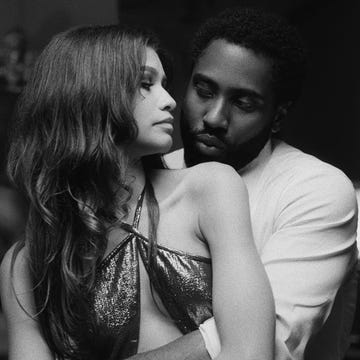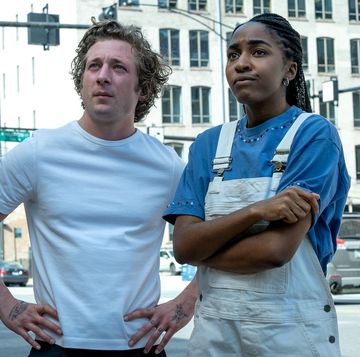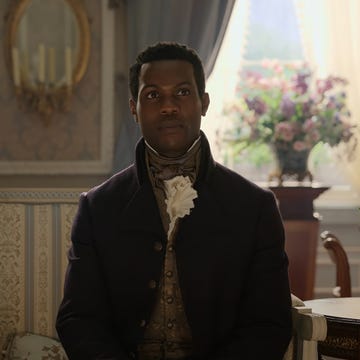When Patti Harrison walks up to the lectern in Yearly Departed, the new Amazon stand-up special set in a funeral home, she commands the room in a way not quite like the rest of the special's powerhouse roster of funny women. The lineup features the likes of Tiffany Haddish, Sarah Silverman, Rachel Brosnahan, and Ziwe Fumudoh each clad in black and eulogizing a different cultural casualty of 2020, putting to rest the very concepts of "casual sex," "beige Band-Aids," and "pants." Dressed like a modern take on a widow out of a gothic horror story with a Euphoria makeup look, Harrison tearfully bids farewell to "rich girl Instagram influencers," whose opportunities for globetrotting sunset selfies and freebie-toting #ads either dried up or became tone-deaf in a year that included a global pandemic and international Black Lives Matter marches. ("You got involved. When protests erupted across the country, you waited one full day before posting your sponsored results from your belly-smoothing skinny diet tea.") She delivers the eulogy with the feeling and conviction of, well, a eulogy before, voice quivering, she makes a joked about, say, a sponsored partnership with Enron. While she may veer the furthest into "alt-comedy" of the special, she arguably delivers its biggest crowd-pleaser.
"Patti is somebody who's just funny as neutral," says Bess Kalb, the special's head writer. "She's funny before she opens her mouth. Then there will be a millisecond of an arched eyebrow, and she'll just destroy a room." Harrison's own stand-up includes a mix of musical comedy and slow-burn absurdist jokes that are at first delivered straight-faced but then build and build until Harrison lands some weird, unexpected punchline. In both cases, her delivery requires a unique dedication to form that Harrison has in spades. Viewers have glimpsed it on Hulu's Shrill, where she plays a mildly sociopathic office assistant, or on her viral appearance on The Tonight Show with Jimmy Fallon, where Harrison, a trans woman, mocks Donald Trump's efforts to ban transgender people in the military.
"There are very few people in comedy who are doing something completely original, and Patti is one of those people," says Kalb. "Her entire aesthetic on Instagram, her presence as a stage performer, her work as a writer—Patti is just Patti in whatever she does." Over the course of a year that's brought on COVID-19, an economic recession, a racial reckoning, a chaotic and divisive election, and murder hornets, a crop of social media-savvy comedians have helped followers process the events, big and small, via an unflinching direct assault: Ziwe Fumudoh's cringe-laden conversations about race with the likes of Alison Roman, Alyssa Milano, and Caroline Calloway; Sarah Cooper's Trump lip-syncs; Jordan Firstman as the publicist for the fly that landed on Mike Pence's head. But Harrison's feed has remained in many ways unaffected by the 2020 news cycle, an undisturbed island where Patti is just Patti, and where fans looking to catch their breath between doomscrolling sessions can find a brief respite reveling in its weirdness. There Harrison posts slideshows that hide visual gags nine slides deep and 400-word captions with so many twists and non sequiturs that the laughs come with whiplash. She posts visual jokes that look like they should be memes, but are actually just the fruits of Harrison's own twisted imagination. Her selfies often include makeup that looks like they were applied while driving a dune buggy. In the rare case when she jumps on an online trend, she completely demolishes it in the process—like a tearful video claiming, "My manager just called me and told me that I have to make a lip-synch video or they'll leak the 'before' photos from my transition," followed by what can only be described as a cross between a lip-sync and a hostage video. The caption on the post says, "I've been asked in interviews 'what it's like to be a transgender comedian?', and it's always a hard thing to explain. Well, this is what it's like." It's partly a testament to Harrison's dedication to maintaining and evolving her singular comic aesthetic, and partly a side-eye from a comic who's grown increasingly weary of the pressures to be perfect and productive and profitable on social media.
Harrison began the year by launching a monthly comedy series at the Largo, a go-to performance venue in Los Angeles, where she invited friends and fellow comics to be part of a live variety show. "The first show was so, so fun. It was so much fucking fun," says Harrison. "The future looked very bright and full of wonders." Harrison already began planning the next show, and the one after that and the one after that, excited to experiment with the form: themed nights, narrative performances, one-woman shows. "That lasted for exactly five and a half minutes," she says. The second performance was pushed to ride out what everyone assumed would be a short lockdown. Eleven months later, it's still indefinitely postponed.
When I first spoke to Harrison earlier this fall, Yearly Departed was in its nascent stages and she was still coming to terms with how the pandemic had changed the comedy landscape, with so many comics flocking to front-facing camera comedy and Zoom live shows. "There are a lot of weird pressures, I think, that I've just spent a lot of time trying to navigate and negotiate my own feelings about—in terms of being a comedian, and in lockdown, and what that means," says Harrison. She joined the lineup of some livestreamed shows on social media and YouTube, but didn't like seeing herself on her iPhone screen as she performed or watching the infinite scroll of commenters chattering. "I don't feel like I thrive doing livestream comedy, per se. It really triggers a lot of little neuroses that I have about performing and it's not conducive to me to do a good job."
But more than that, Harrison realized that the anxiety of performing online in 2020 was more deeply-rooted than just having to endure delivering jokes to a silent crowd—or worse, to a solitary livestream host forcing polite laughter. The pressure of it all was also eroding her mental health. "There are so many people saying, 'Now's the comedians' time to thrive. They're essential workers. They're bringing people joy.' And that doesn't really accommodate the idea that I'm also having a really, really hard time," she says. "I actually just feel depressed, and I have a lot of real negative feelings I need to work through. So it just felt disingenuous [to perform stand-up]. I wasn't thinking of anything that was funny, or anything that made me laugh. And so I just took this time to try and absorb everything that's going on." She decided to give herself a break, and instead of forcing herself to produce new content, she revisited old work. She began arranging to professionally re-record her musical comedy, which she'd originally made on apps like Garage Band, using the opportunity to edit and update the songs to reflect her current sensibilities. She reposted videos recorded over the past few years, many of which found a new life as they circulated amongst fans discovering them for the first time, right when they needed them the most. (See: Harrison's alt-universe Real Housewives taglines.) "It was at a time I was feeling very, very unfunny, unproductive and uncreative. And those were videos I made when I think I had a lot smaller of a following than I do now. So I was thought, I'm sure there are people who haven't seen these, and I don't feel like I'm in an emotional state to make anything new."
As Harrison's ambivalence to social media grew, she's begun to question if it continues to propel her evolution or if it's begun to stifle her comedy. "I think my relationship with social media has changed so much that I really resent social media now. And I'm trying to figure out what a successful exit strategy is as someone who has gotten a lot of opportunities because of social media and how it's given me a portfolio," she says. "But has the industry integrated social media so much so that I would lose some sort of capital by not having it anymore? By not having a verified account for them to look at? To be like, 'Oh, she's working, and she has this many followers, and she's verified, and she's doing whatever the fuck'? It feels really insidious to me. My moral and ethical compass are spinning."
But the more she's critically questioned her online platform, the more Harrison has tapped a rich vein of her signature silly-but-highly-perceptive commentary. Her own Instagram feed has long been an extension of her stand-up—a kind of deadpan absurdism, sharply honed but wielded with a disarmingly casual delivery, the opposite of the strained posturing of the over-polished influencer accounts that have taken over large swathes of Instagram. So when Kalb and a team of writers including Akilah Green, Franchesca Ramsey, and Jocelyn Richard began developing the pitch for Yearly Departed, they immediately imagined Harrison eulogizing the Instagram influencer. Kalb had also worked with Harrison before and once witnessed her bring the house down at a live show where she delivered a monologue through hysterical sobs. So the writers decided to hand her the topic and let her run with it. "We literally wrote this for Patti," says Kalb. "There just wasn't another option."
When Kalb and another writer, Karen Chee, formally pitched the idea to Harrison in a Zoom meeting that also included some executives, they ended up giving the group a crash-course in Harrison's comedy style as the meeting devolved into a jokey war of words. "Suddenly the three of us started threatening to sue each other, and the meeting turned into three comedians having this mortifying conversation until another producer on the call was like, 'Just so that we're all clear...do you want to do this project or not?'" remembers Kalb. "There's just always something about Patti—she'll elevate a regular situation into a comedic one, then bring everybody else on board, and suddenly we're all in her world."
Harrison's eulogy is one of the longest and strongest of Yearly Departed—a feat not just because she delivers it amongst a stacked lineup of fellow comedy vets, but because none of them were actually present when she delivered it. Because of COVID-19 safety measures, the comedians in Yearly Departed shot their sets at different times, mostly in small groups, with the whole cast assembled on one screen in post-production via VFX. But Harrison performed her act for a room full of chairs, some propping up cardboard cutouts, with only two writers present to call out any audience reactions that were written into the script. "It's a testament to her skill as a stand-up that she was able to deliver a full performance, anticipating reactions and feeding off of an invisible crowd," says Kalb. "And as somebody who is very uncool on Instagram, I feel like Patti is giving both great comedy and great social critique at the same time—but she would also hate that description."
Whether she likes it or not, Harrison is an expert at burying social critique beneath absurdist joke structures, grotesquely funny visual ambushes, musical stylings, and outcast characters, but not so deeply that you can't still cut yourself at the joke's razor-sharp core. When Harrison first posted the Yearly Departed trailer on Instagram, Brosnahan (who's also an executive producer) commented, "No one does it like you!" It's just a little celebrity encouragement dashed off in the comments, but it also may be the most succinct description of Harrison's appeal. Like so many of us, 2020 canceled all her plans and professional outlets; at times, it zapped her of her creativity and confidence while turning up the pressure to be creative and confident online; it fast-tracked her conflicted relationship with social media. But not many of us put on our hottest funeral duds, and delivered surprise punchlines about Enron, all while maybe, just maybe, venting out the real frustrations of a frustrating year.
"I don't want to sound like I'm saying, 'Yeah, I traveled into a whole new space, explored the world of creativity, and I'm at my next level, and I'm evolved, and blah blah blah,'" says Harrison. "I am coming out of a huge rut, and I feel like I'm shaking off a lot of mental debris. Now I'm feeling optimistic and positive, but that's after a long time of feeling very hazy." Harrison hopes to one day revive her Largo show if she can. "I'm sure all my very, very evergreen Love is Blind season one recap material will still be very fresh." Until then, Harrison's written for Big Mouth, which just released its newest season, and she'll appear in The History of Swear Words, hosted by Nicolas Cage. Fans are still waiting to know the confirmed third season of Hulu's Shrill will arrive, and fan favorite Harrison with it. And for the time being, Harrison's threats to go dark on social media persist. I ask Kalb if she thinks Harrison will go through with it. "I know better than to assume I know what Patti will do," she says. "I wait—and I wait in awe."

Nojan Aminosharei is the Entertainment Director of Men’s Health and the Special Projects Editor of Harper’s Bazaar. He was previously the Entertainment Director of Hearst Digital Media, and before that a Senior Editor at GQ. Raised in Vancouver, Canada, Nojan graduated from NYU with a master’s degree in magazine journalism. The late Elaine Stritch once told him, “What the fuck kind of name is Nojan? I’m 89 years old, I don’t have time for that shit.”















